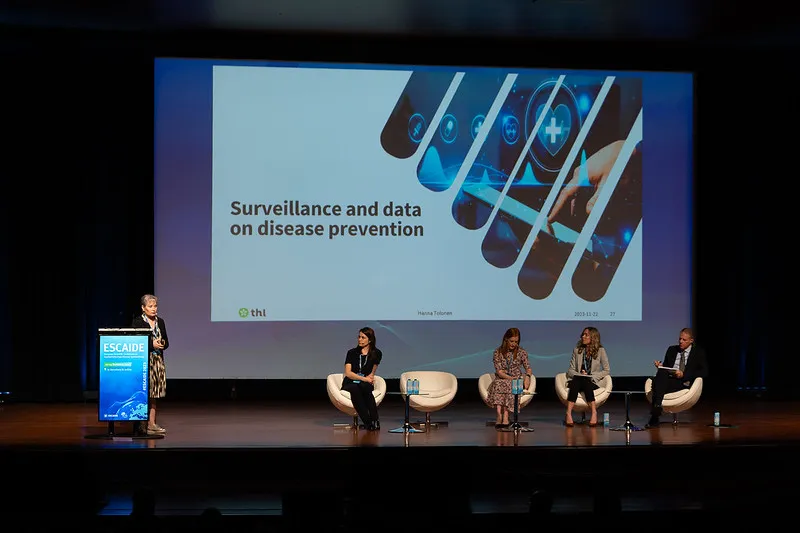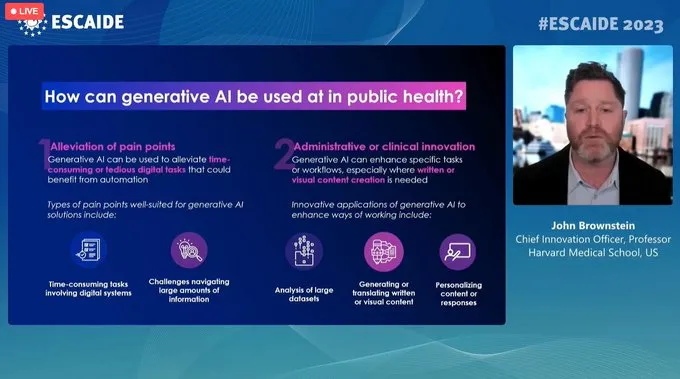ESCAIDE 2023 - A summary of Day 1

The first day of ESCAIDE kicked off with a warm welcome from Andrea Ammon (ECDC), Fernando Simón (Spanish Ministry of Health), Carmen Cabezas (Catalan Public Health Agency), and Manel Balcells (Catalan Councilor of Health).
This was followed by the first plenary, which focused on revisiting the concept of prevention for communicable diseases. It was chaired by ESCAIDE Scientific Committee members John Kinsman (ECDC) and Petronille Bogaert (European Commission) and featured three speakers with different experiences on the importance and application of prevention in public health. Some of the discussed topics included how to maintain people’s confidence in vaccination, the relevance of timely and reliable data collection to gain knowledge and ensure evidence-based policy making, and how to create engaging platforms to raise awareness on prevention.
"How can the lessons we learn from non-communicable diseases be taken into communicable diseases? Identification of high risk groups, based on data, is a good starting point". - Hanna Tolonen, Director of Research, Development and Innovation at the Finnish Institute for Health and Welfare speaking in Plenary A

During the lunch break, while some attendees enjoyed a guided tour of the National Art Museum of Catalonia, others had the opportunity to follow a panel on career advice. Some of the key professional development tools given included: curiosity, adaptability and resilience, courage to take different paths, and daring to reach out and network.
The poster sessions covered a wide range of topics, ranging from antimicrobial resistance to tuberculosis. COVID-19 was present in multiple sessions, which focused on vaccine effectiveness, surveillance, and burden of disease. A recurrent topic in the different sessions was the screening of displaced people fleeing from Ukraine, and the important of timely, reliable surveillance data in public health.
"AI can be used for good, but only if we address the bad first." - Joanna Goodey, Head of research for Justice, Digital and Migration at the European Union Agency for Fundamental Rights (FRA), speaking in Plenary B

In the different fireside sessions, diverse public health topics were addressed. These included the strategies and challenges in surveillance, highlighting the important role of whole genome sequencing and wastewater surveillance, as well as the importance of cross-border monitoring in food borne diseases. Furthermore, high relevance was given to COVID-19, and especially to vaccine effectiveness. Valid, rigorous, and long term funded observational vaccine effectiveness studies were named as being key to guide the adaptation of vaccination programmes and policy decisions for new and existing vaccines.
Today’s final plenary covered digital transformation within public health and the challenges and possibilities of Artificial Intelligence. Both sides of the very current debate were addressed, with speakers discussing the value of generative AI in cutting costs and enabling the practice of public health, as well as the risks associated with the information and capacity to use AI tools. The importance of an EU-wide AI Act, which is currently being negotiated, to ensure compliance to fundamental rights within the EU was emphasized. The panellists concluded that the current digital transformation comes with both anxiety and excitement and should be addressed through multisectoral partnerships.
Share this page
